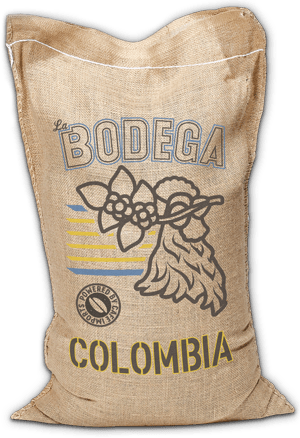Colombia – Women Producers – ASMUCAFE – El Tambo – Cauca – Castillo and Colombia B21443
Specs:

Source:
Colombia
Region:
Cauca
Farm:
Women ASMUCAFE
Variety:
Castillo, Colombia
Altitude:
1400-2000 MASL
Processing:
Washed
Program:
Women Coffee Producers
Notes:
"Jammy passion fruit and dark chocolate with mellow savory flavors. Sugary sweetness and tart malic acidity."
Score:
Price/Bag:
$5.16 per lb
$227.00 per bagOut of stock
Background:
Women Producers
In attempt to recognize and promote the work women do growing and producing coffee around the world, the Women Coffee Producers project was established in order to highlight organizations and associations of women producers in various countries. The program aims to address the widespread wage inequity that women experience by adding a gender-equity premium on top of a base price; this premium is paid directly to the growers for use in any manner they choose.
Women ASMUCAFE
ASMUCAFE stands for Asociación de Mujeres Agropecuarias de Uribe, an organization of women farmers and landowners in El Tambo, a municipality within Cauca. The women's mission as an association is to improve their families' quality of life through coffee farming and to contribute positively to their community by working together and sharing resources, knowledge, and support. "Our work is determined by our values such as responsibility, honesty, commitment, respect, solidarity, and competitiveness," they say. A special price premium is added to this coffee which is used towards projects aimed at female empowerment in the association.
The coffee, all of which is of Castillo or Colombia variety, is picked as purple (Castillo) or bright red (Colombia) cherry, and undergoes a somewhat unusual "double" fermentation process, as the women describe it: First, the cherries are left in the loading hoppers for 14 hours, then they are depulped in the afternoons and evening hours and placed into traditional open fermentation tanks for another 10 hours. Then they are washed three to four times before being dried either in parabolic dryers or in the sun for 8–12 days
Recommendations
-

Bolivia – FTO La Paz – La Cooperativa Corpus Cristhy Illampu R.L – Red Catuai & Typica – FLO ID 3645
$ 5.14 per lb Add to cart -

Brazil – Organic Cascara – Cascara Tea – Espirito Santo – Fazenda Camocim – Biodynamic
$ 15.87 per lb Add to cart -

Burundi – Microlot – Gakenke – Kayanza – Washed
$ 6.05 per lb Add to cart -

Colombia – Decaf Origin Select – EA Decaf de Cana – Huila
$ 5.27 per lb Add to cart




